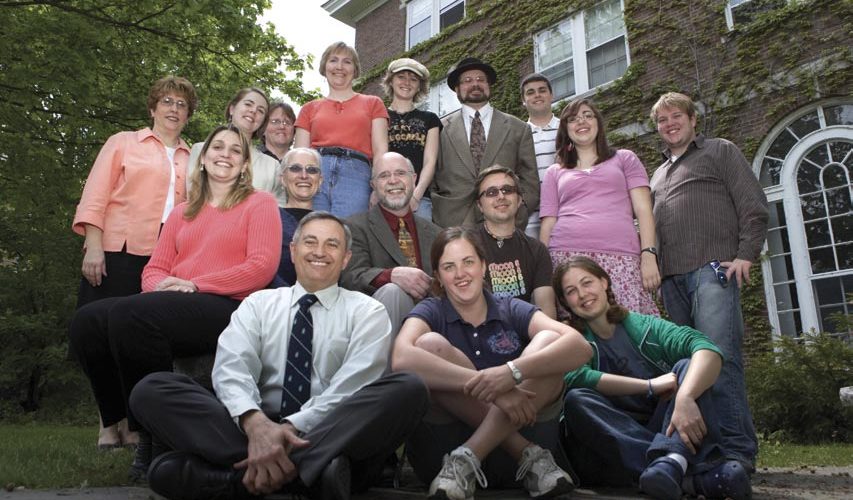by Robert Fitzpatrick, Dean of the Academic Experience

Robert Fitzpatrick (center) with College of University Studies advisors and students. John Hession photo.
I don’t think my son understands that he can’t get a job with an English degree unless he goes on to graduate school!” I hear concerns like this from parents often, but I didn’t expect such a profound misconception to come from this particular parent, who happened to be a college professor.
Let’s put the underlying concern on the table before we go any further: college is an expensive investment. Few parents can afford to finance their child’s college education without a considerable sacrifice. And while I was able to earn enough money over the summer to nearly cover my tuition, room, and board when I was a student, today’s students are lucky if they have a job that pays minimum wage. Much of what they earn ends up paying for gas to get them to and from their jobs.Who wouldn’t want some guarantee that the degree they’re bankrolling is more than a ticket to the starting gate of the job market?
Rare is the first-year college student who can honestly say, “I know that I want to be an accountant for the rest of my life.” With very few exceptions, most college students have no idea what they want to do with the rest of their lives. I didn’t when I was a student. I changed my major almost every semester. My academic advisors weren’t much help, and I didn’t really expect much from them. But I was lucky: despite my confusion, I graduated in four years with a degree in English that I’m still very glad I pursued.
The College of University Studies
The College of University Studies here at Plymouth State University is the program I wish I had had access to as an undergraduate. Our mission is to help deciding students—those students who have yet to select a major—with the resources and personal attention they need to choose a major appropriate to them and plot a course leading to graduation by the most efficient route possible.
The program, which became available to students during the 2005–2006 academic year, was fostered by Virginia Barry, former PSU provost. Upon his retirement, former President Donald Wharton started an endowment to support our efforts. Ongoing support from President Sara Jayne Steen, Interim Provost Julie Bernier, Vice President for Student Affairs Richard Hage, and Vice President for Financial Aairs William Crangle has been, and will continue to be, invaluable to the program’s success.
How the Program Works
Before the fall semester begins, we invite all deciding students to become members of the College of University Studies. Not everyone takes us up on the offer. Once a student does, however, we start the conversation about the subjects he or she likes. Based on the student’s level of engagement, we work together toward selecting a major.
Through the program, students have access to extremely dedicated volunteer academic advisors, including PSU Interim Registrar Joyce Larson; Associate Director of Financial Aid Crystal Finefrock; CIO Dwight Fischer; Vice President for Student Affairs Dick Hage, Sue Keefe of Plymouth Academic Support Services, and many others.
Students also have the opportunity to meet privately with academic counseling students from the graduate program. They discuss the results of career interest inventories
as well as their personal goals. Every conversation helps students get closer to a decision.
During the pilot year of the College of University Studies, 17 of the 50 students in the program were on the Dean’s List or the President’s List, a larger percentage than
deciding students not enrolled in the program. Tat high number of honor students certainly quashed the assumption some may have had about deciding students not being as ready for college as students with a major.
The program may not work for everyone. Students must exercise a fair level of commitment to the process in order to benefit. But for those who do, the results are impressive: most students choose a major by the end of their first year and are on their way to earning a degree in four years.
Encouraging Lifelong Learning
Graduates can get a job with any degree. And while many graduates find jobs that are closely related to their major, it’s not unthinkable that an art major will someday work in a human relations department, or that an English major will work for a graphic design firm, or that a sociology major may eventually work in a marketing office.
What’s important is that students are turned on to the world of learning, feel a sense of accomplishment, and want to continue to learn for the rest of their lives. The combination of knowledge, enthusiasm, ability to learn, and personal happiness will impress any prospective employer as much as, or even more than, a college degree. Though it may sound cliché, I tell every student I advise to heed Joseph Campbell’s advice: “follow your bliss.”
On the Move
For the past two years, Professor Matthew Rolph, graduate student intern Joe Cullen, and I have been working out of the Robert Frost House, a beautiful building
on this incredibly beautiful campus, which serves us well but lacks space for students to hang out. Beginning fall 2007, the College of University Studies will have a new home in the renovated Mary Lyon Residence Hall. The garden level, where the bowling alley was all those years ago, will have offices, a cyber lounge, and meeting areas. Since most of the students in the program will also be living in Mary Lyon, they will have the added convenience of being able to simply walk down a flight of stairs from their rooms to get academic advice and support.
I hope I’ll get a chance to talk to each of them 10 years from now to see how their stories unfold.








